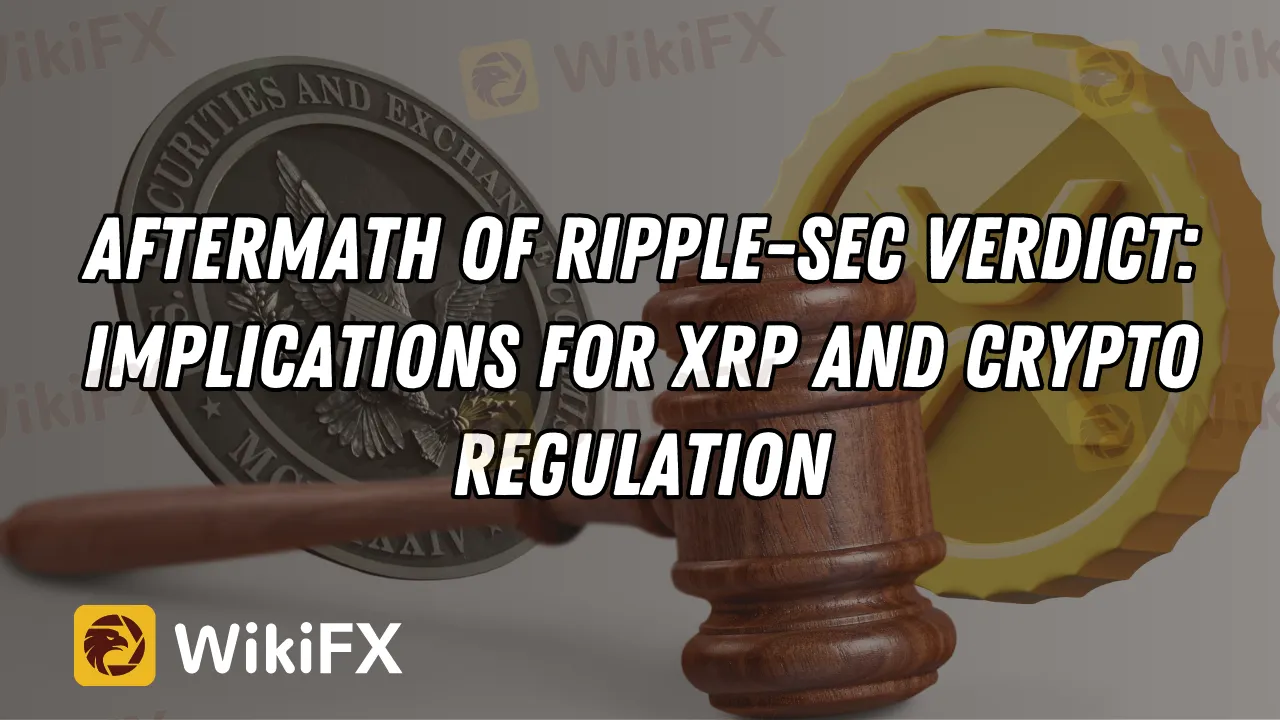简体中文
繁體中文
English
Pусский
日本語
ภาษาไทย
Tiếng Việt
Bahasa Indonesia
Español
हिन्दी
Filippiiniläinen
Français
Deutsch
Português
Türkçe
한국어
العربية
Aftermath of Ripple-SEC Verdict: Implications for XRP and Crypto Regulation
Abstract:Uncover the Ripple-SEC verdict's impact on XRP and the crypto industry, along with the ongoing challenges in crypto regulation clarity.

In a recent legal showdown in the Southern District of New York, the Securities and Exchange Commission (SEC) faced an unexpected blow in its case against Ripple Labs, which stirred the crypto industry. However, as the dust settles on the court verdict, it's becoming increasingly evident that Ripple's victory and the resulting buoyancy of the XRP token may have been somewhat premature. While there was a surge of optimism, the fact remains that the ruling falls short of providing the clear regulatory clarity that the crypto community has been yearning for.
Ripple Labs and SEC: A Legal Dance
Ripple Labs, the San Francisco-based payment protocol company, found itself embroiled in an intense legal battle with the SEC over the status of its digital token, XRP. The SEC had contended that Ripple's sale of XRP constituted an unregistered securities offering, a claim Ripple fiercely disputed.

However, in an unexpected twist, the judge ruled that XRP isnt a security when sold on exchanges and via algorithms, but classified it as such when sold to institutional buyers. This paradoxical verdict, while providing some reprieve to crypto players such as Cardano and Solana who also found themselves in the SEC's crosshairs, still leaves room for ambiguity.
The partial victory for Ripple does little to quell the legal uncertainty shrouding the crypto industry.
XRP's Price Surge and the Crypto Market
Despite the lack of decisive legal clarity, the court's decision had a significant impact on XRP's market performance. The news of Ripple's partial victory propelled the value of XRP, causing it to almost double.
Trading volumes of the crypto momentarily surpassed all other cryptocurrencies, as investors rallied behind the embattled token.

However, with the excitement now beginning to wane, many are acknowledging the reality of the situation. The ruling, though seen as a setback for the SEC's efforts to regulate (or, as some argue, suppress) crypto, fails to establish a solid legal framework for the digital asset industry.
Ongoing Regulatory Uncertainty
One of the most glaring shortcomings of the verdict is its potential to provoke more legal debates and interpretations, further muddying the already unclear legal waters. Moreover, the ruling leaves the door ajar for the SEC to possibly appeal the court's decision.

Notably, this protracted and arguably unproductive legal battle raises questions about the state of crypto regulation in the U.S., compared to other jurisdictions. The European Union, for example, has implemented workable regulatory frameworks for the crypto industry. This situation sharply contrasts the U.S. approach where the regulatory landscape remains inconsistent, with the SEC attempting to fill the policy vacuum through litigation.
Given the U.S.'s historical role as a pioneer in regulation and the inherently innovative nature of crypto, many believe it is only reasonable to expect a more constructive and transparent approach.
The Path Forward
As Ripple and the SEC continue to navigate these murky waters, the verdict's implications on the broader crypto market remain to be fully understood. As we've seen, the reaction was swift with a surge in XRP's price, but the long-term impact will likely depend on how the legal intricacies continue to unfold.
To stay updated on the latest developments in this legal saga and the broader crypto market, consider using platforms such as the WikiFX App. Information is key to successfully navigating the crypto landscape, and staying abreast of developments in regulatory frameworks can provide valuable insights.
Download link: https://www.wikifx.com/en/download.html

With its robust focus on XRP, SEC, crypto, and Ripple, this ongoing case is a must-watch for any industry observer, regulatory body, or crypto investor. It serves as a potent reminder of the urgent need for unambiguous regulatory clarity to ensure the sustainable growth of this burgeoning industry.
Disclaimer:
The views in this article only represent the author's personal views, and do not constitute investment advice on this platform. This platform does not guarantee the accuracy, completeness and timeliness of the information in the article, and will not be liable for any loss caused by the use of or reliance on the information in the article.
Related broker
Read more

Kraken Offers $105 Fee Credit for FTX Fund Recipients
Kraken offers $105 in trading fee credits to FTX fund recipients, enabling $50,000 in crypto trading on Kraken Pro with zero fees. Secure your funds today!

Standard Chartered Secures EU Crypto License in Luxembourg
Standard Chartered secures Luxembourg crypto license, focusing on Bitcoin and Ethereum custody services as it expands digital asset solutions across the EU.

U.S. to Auction $6.5 Billion in Bitcoin in 2025
The U.S. government plans to auction $6.5 billion in Bitcoin seized from Silk Road in 2025. Analysts debate market impact as BTC prices show mixed reactions.

Female Celebrity Voluntarily Surrenders Over SEC Violation Charges
Rufa Mae Quinto faces 14 counts of SEC violations linked to Dermacare's investment scheme. She denies fraud allegations and posts P1.7M bail.
WikiFX Broker
Latest News
High-Potential Investments: Top 10 Stocks to Watch in 2025
US Dollar Insights: Key FX Trends You Need to Know
Why Is Nvidia Making Headlines Everywhere Today?
Discover How Your Trading Personality Shapes Success
FINRA Charges UBS $1.1 Million for a Decade of False Trade Confirmations
Bitcoin in 2025: The Opportunities and Challenges Ahead
BI Apprehends Japanese Scam Leader in Manila
Big News! UK 30-Year Bond Yields Soar to 25-Year High!
SQUARED FINANCIAL: Your Friend or Foe?
Join the Event & Level Up Your Forex Journey
Currency Calculator






